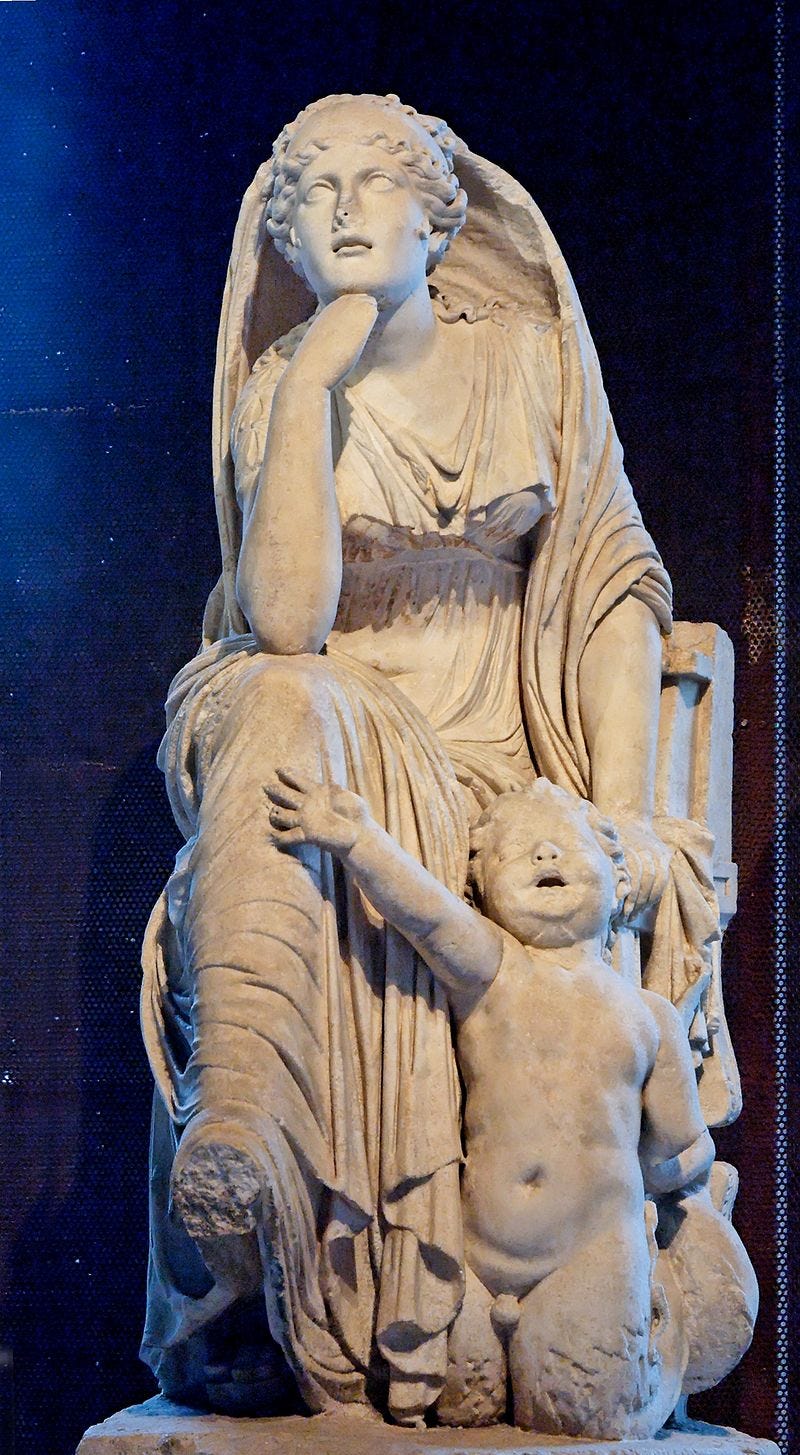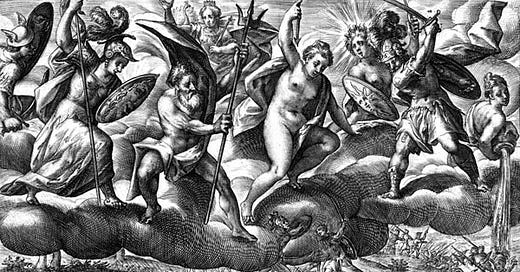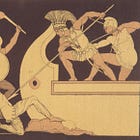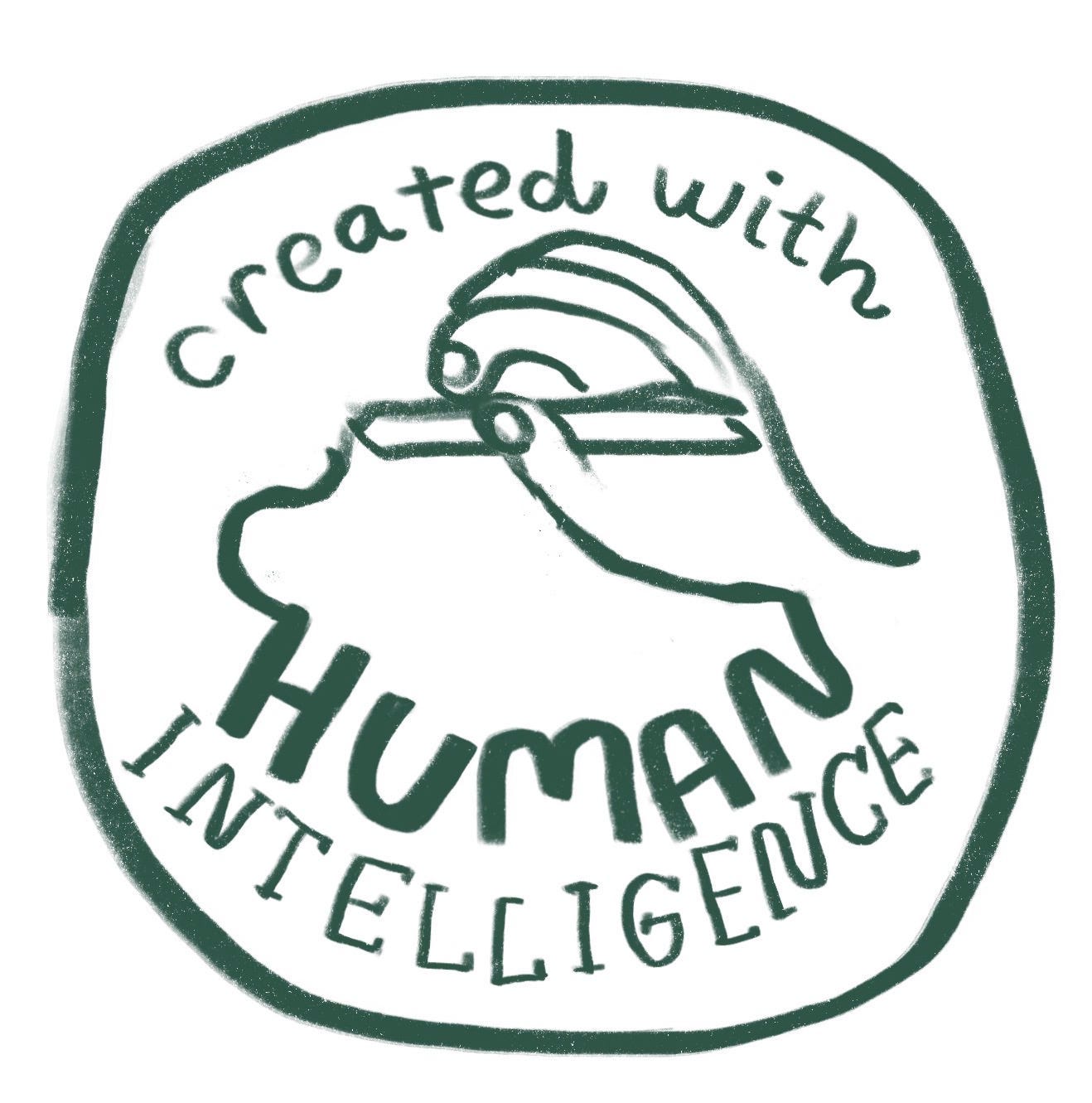Exploring Life through the Written Word
“Now let all you immortals go to war with each other— let the Trojans and Achaeans fight it out themselves. If Achilles fights alone, they’ll never drive him back— never—he’ll never quit till he’s gone through the line, till he reaches the wall.”
Dear friends,
Book 20 of The Iliad marks a turning point in the narrative, an inflection where divine restraint gives way to divine fury, and where Achilles reenters the war not merely as a hero, but as an elemental force of vengeance. This book functions almost like a cosmic unshackling: Zeus, having allowed fate to take its course, now gives the gods permission to intervene directly in the battle. This decision explodes into divine chaos and mortal reckoning.
The book opens with Zeus summoning the gods to assembly on Mount Olympus. He announces that he will step back from direct interference and allow the other gods to enter the war freely, aligning themselves as they wish. The divine allegiances reflect long-standing sympathies: Hera, Athena, and Poseidon side with the Achaeans, while Apollo, Artemis, Aphrodite, and Ares favor the Trojans. This divine alignment sets the stage for a war on two fronts—one human, one divine.
As the gods descend into the fray, Achilles prepares for battle. His armor, newly forged by Hephaestus, gleams with divine power. Achilles has cast aside his grief—momentarily—and is now focused on exacting revenge for the death of Patroclus. Yet Zeus, though stepping back, ensures that Achilles does not defy fate: he warns the gods that Achilles must not be allowed to sack Troy before its destined time. Even Achilles, the mightiest of warriors, cannot override destiny.
Achilles’ wrath manifests first in a surge into battle. Like a firestorm, he rushes into the Trojan ranks, scattering warriors in his wake. His presence alone terrifies the Trojans, whose retreat grows chaotic. As Achilles wreaks havoc, Aeneas, the noble Trojan son of Anchises and the goddess Aphrodite, steps forward to face him. It is a moment of tension: a potential torch-passing in Trojan legacy, but also a test of courage and divine manipulation.
Before their clash, each hero delivers a lengthy boast, invoking ancestry and noble deeds. Achilles speaks with scorn, reminding Aeneas of their past encounter and dismissing him as inferior. Aeneas, undeterred, asserts his lineage and divine favor, knowing that his destiny—unlike many Trojans—is not to die here. As they fight, the gods intervene. Poseidon, though an Achaean supporter, rescues Aeneas from death, recognizing that Aeneas is fated to survive and eventually become the founder of a new Trojan race.
The narrative continues to swell with divine activity. Apollo urges Hector to confront Achilles, though he knows Hector’s death looms. Still, Hector is not yet fated to die in this encounter. The confrontation between the two is intense. Hector throws his spear at Achilles, but Athena swats it aside. Achilles hurls his own spear, only to miss as Apollo whisks Hector away in a shroud of mist. Hector is saved—not by his strength or cunning, but by divine intervention. Achilles, frustrated but undeterred, turns his rage upon other Trojans, killing Iphition, Demoleon, Hippodamas, and others in quick succession.
This book ends not with resolution but with escalation. The gods are now active players on the field, and Achilles is a man untethered from all but his rage and his destiny. The war has entered a new phase: no longer bound by human limitations, it has become a theatre of divine judgment and existential violence.
Book 20 of The Iliad is often read as a violent interlude or a theatrical showcase of divine warfare, but it is much more than a spectacle. It is a chapter of profound tension between fate and free will, between mortal action and divine orchestration. It reminds us that while men believe themselves to be the agents of their destiny, there are greater forces—cosmic, spiritual, or psychological—that shape the contours of human experience.
At the heart lies the reentry of Achilles, and with him, the concept of unrelenting, righteous wrath. Achilles has moved beyond grief; he now embodies a singular purpose. His wrath is not only personal but apocalyptic. He is not merely a man avenging his friend—he becomes a figure of death itself, an avenger whose presence alters the balance of the world.
The literary structure serves to highlight the blurring of mortal and divine boundaries. For the first time since the beginning of the war, the gods are no longer passive manipulators—they are warriors. Their descent into the battlefield symbolizes the collapse of the barrier between heaven and earth. Poseidon strides alongside the Achaeans; Apollo shrouds Hector in mist. This descent signals a kind of narrative climax—not the end of the war, but its metaphysical crescendo.
Achilles and Aeneas’s confrontation is one of the most intellectually rich moments in the epic. It is not only a clash of warriors but a meditation on heritage and fate. Achilles, the mortal demigod, mocks Aeneas’s noble lineage, but he too is vulnerable. Aeneas, though overpowered, is saved by Poseidon—not because of bravery or cunning, but because of his future. In this, Homer weaves the idea that some lives are preserved not by virtue of the present, but because of the necessity of the future.
Here, Homer introduces what we might now call “transhistorical responsibility”—the idea that one’s existence may serve a future beyond comprehension. In preserving Aeneas, the gods are not preserving a soldier; they are preserving the seed of civilization. This concept—of individual suffering or endurance justified by a future yet to unfold—resonates deeply in our modern world, where historical traumas are often contextualized by what they give rise to, and where leaders and thinkers grapple with legacies and consequences.
From a modern lens, this book serves as a parable for the dangerous seduction of power and the illusion of autonomy. Achilles returns to battle with unmatched might, but his strength cannot alter destiny. Zeus explicitly warns that Troy cannot fall before its time, reminding us that even the most powerful are bound by structures beyond their control. This mirrors contemporary anxieties about technological power, military might, and human ambition. Even in the 21st century, we are reminded—through pandemics, climate change, and war—that human agency exists within limits.
The gods function as metaphors for ideology, emotion, and internal conflict. Athena’s intervention may be read as the rational mind restraining chaos; Apollo’s rescue of Hector, as mercy in the face of annihilation. The divine battlefield is also an internal one. Achilles’ return to war is not just external action but internal conflict made manifest. His armor may gleam with divine fire, but his soul is scorched by the very fury that animates him.
Moreover, Homer’s decision to allow gods and mortals to share the battlefield in equal measure mirrors the way our modern decisions are rarely individual. They are influenced by society, culture, emotion, and belief. A soldier may march into war for his country, but he also carries with him his gods—his convictions, his fears, his ancestors. Book 20 externalizes this multiplicity. A battle is never just between men; it is a clash of histories, ideologies, and metaphysical weight.
Perhaps the most enduring lesson is its exploration of heroism not as conquest but as restraint. Aeneas is saved not because he defeats Achilles but because he is destined to survive. Achilles, in turn, is reminded that even his might cannot bend time. Heroism, Homer suggests, is not just in killing but in endurance, in knowing one’s place in a larger story.
This resonates today in the face of collective trauma and social upheaval. Whether in activism, leadership, or personal loss, modern readers can draw strength from Homer’s vision of human life as shaped both by action and by the acceptance of one’s role within a greater fate. We are not always the architects of our world, but we are always participants in its unfolding.
Book 20 of The Iliad stands as one of the most dynamic chapters in Homer’s epic, not just because of its action but because of its philosophical weight. It marks a moment where mortal and divine spheres collide, where the limits of heroism are tested, and where destiny begins to crystallize around the major figures of the poem. Achilles emerges not just as a hero, but as a harbinger. His path forward is unchangeable, and all who stand before him must now contend with the fury he brings.
And yet, within this chaos, there are moments of clarity—moments when fate pauses and reminds us that history is not made only by victory, but also by survival, mercy, and vision. In a modern world brimming with crisis, noise, and ambition, Book 20 offers a vision of humility: that no matter how mighty we become, we remain—like Achilles and Aeneas—bound to the divine threads of fate, courage, and the stories that live on after us.
“But even now, beware—don’t face Achilles, alone, out in the front lines. He’s more than a match for any mortal man.”

Origins of the Silver-Footed Goddess: The Historical and Mythological Context of Thetis
Thetis, the luminous sea nymph and mother of Achilles, occupies a profound and poignant role within the tapestry of Greek mythology. Though often overshadowed by the mighty gods of Olympus or the heroic exploits of her son, Thetis is a character of tremendous complexity, bridging the divine and the mortal worlds with a presence marked equally by power and pain. To understand Thetis is to engage with ancient conceptions of motherhood, divinity, fate, and sorrow. She is at once a symbol of maternal devotion and a tragic witness to the limits of divine intervention.
In the oldest traditions, Thetis is a Nereid—a daughter of Nereus, the so-called “Old Man of the Sea,” and Doris, an Oceanid. As one of fifty sea nymphs, she belonged to a vast aquatic realm of shapeshifting beauty and ephemeral power. However, Thetis’s particular fate would elevate her above her sisters. The mythographers, especially Hesiod in the Theogony, portray her as distinguished among the Nereids for her grace and prophetic abilities.
One of the most enduring myths surrounding Thetis comes from the prophetic warning delivered to Zeus and Poseidon: that Thetis would bear a son more powerful than his father. Both gods, who had once vied for her affection, recoiled at the possibility of being overthrown by their own progeny, much as Cronus had overthrown Uranus, and Zeus had later dethroned Cronus. Thus, they arranged for Thetis to marry a mortal—Peleus, a Thessalian king. This act was both a sacrifice and a safeguard, ensuring that her offspring, while glorious, would not threaten the divine hierarchy.
Their union, celebrated in mythic grandeur and chaos, famously sparked the events leading to the Trojan War. Eris, the goddess of strife, was not invited to the wedding and in revenge threw the golden apple inscribed “To the fairest,” igniting the Judgment of Paris and the conflict that would culminate in the fall of Troy. In this way, Thetis is not only a participant in myth but a silent catalyst—her forced marriage and maternal destiny become the starting point of the greatest war in ancient literature.
Yet this grandeur belies her personal tragedy. Married unwillingly to a mortal, Thetis bore Achilles with the foreknowledge that he, too, was fated to die young. In this, Thetis embodies the quintessential figure of mournful prophecy. Her knowledge does not prevent her son’s death, nor can her divine status protect him. She becomes a goddess marked not by omnipotence but by powerlessness in the face of destiny.
Thetis in Ancient Literary Works
Thetis’s most prominent appearance in literature comes in Homer’s Iliad, where she serves as both a divine character and a thematic symbol. In Homer’s telling, she is “silver-footed Thetis,” the epithet evoking both grace and otherworldliness. Her appearances are few but unforgettable, charged with emotion and maternal sorrow. She is at once reverent before Zeus and pleading as a mother. Her role in the epic is to intercede for Achilles, but her emotional core defines her more than her function.
In Book 1 of The Iliad, when Agamemnon dishonors Achilles by taking Briseis, it is Thetis to whom Achilles turns. We see him not as a fearsome warrior, but as a weeping son:
“Weeping, Achilles withdrew from his friends and sat
by the surf of the gray sea, looking out over the endless waters.
Stretching out his arms, he called to his mother, Thetis of the silver feet.”
Thetis hears his cry from the depths of the sea and rises to comfort him. This act is emblematic of her character: deeply attuned to her son’s suffering, swift to respond, yet ultimately unable to shield him from fate. She ascends to Olympus and kneels before Zeus, clasping his knees and begging for Achilles to be honored. The gesture is striking—not only for its humility but for its boldness. A minor sea goddess daring to entreat the king of gods shows the power of maternal love in Homer’s world.
She appears again in Book 18, when Achilles learns of Patroclus’s death. He cries out in grief, and once more Thetis emerges from the sea, surrounded by her Nereid sisters. Her lamentation is haunting:
“Ah my child—my sorrow, my life!
Why did I ever bear you? All I gave was doom.”
It is one of the most moving expressions of maternal despair in ancient literature. Thetis mourns not only her son’s pain, but the entire trajectory of his life. She knows from the beginning that Achilles is doomed. His fate is not an abstraction—it is a shadow that darkens every joy, every victory.
Thetis also plays a crucial role in bringing Achilles his new armor, forged by Hephaestus. In Book 18, she descends to the forge of the gods, appealing to the smith to create arms for her son. The shield of Achilles becomes one of the most famous ekphrases in Western literature, depicting the cosmos, the city at peace and war, and the full breadth of human experience. Thetis is thus a mediator between realms—bringing divine craftsmanship into the mortal world, arming her son not only with weapons but with the symbolic weight of human existence.
In other ancient sources, such as Pindar, Aeschylus, and later Roman poets like Ovid and Statius, Thetis appears in various lights: a powerful sea nymph, a mourning mother, a reluctant bride. These portrayals collectively emphasize her hybridity—divine yet human in feeling, immortal yet bound by the suffering of mortals. She is never merely a background figure; she is an axis around which powerful myths unfold.
The Goddess of Grief: Analysis of Thetis’s Character
Thetis defies the conventional expectations of a goddess. Unlike Athena, who embodies wisdom and war, or Aphrodite, who radiates desire and allure, Thetis’s defining trait is sorrow. She is a goddess who laments. Her powers—shape-shifting, prophecy, summoning other Nereids—are subordinate to her overwhelming emotional depth. In this way, Thetis becomes one of the most human figures in the divine pantheon.
This tension between divine capability and emotional vulnerability makes her a compelling subject of literary analysis. She embodies the paradox of power and powerlessness. Though she can move the will of Zeus and receive favors from Hephaestus, she cannot alter her son’s destiny. Her knowledge of the future becomes a burden, not a tool. In modern psychological terms, Thetis experiences anticipatory grief: the emotional suffering caused by foreseeing a loss that has not yet occurred. Her presence in The Iliad prefigures the genre of tragedy—she is both participant and mourner before the fact.
Thetis’s maternal identity is central to her character. Unlike Hera, whose motherhood is largely political, or Demeter, whose maternal grief is linked to cyclical regeneration, Thetis is a mother whose love leads not to hope but to despair. Her relationship with Achilles is intimate, raw, and emotional. She comforts him, counsels him, arms him, and mourns him. She becomes the archetype of the mother who gives everything and receives only the anguish of loss.
Moreover, Thetis’s forced marriage to Peleus adds another layer of complexity. She is not a goddess who chose love; she is a deity coerced into union with a mortal. Her repeated attempts to escape Peleus—shifting into fire, water, lion, serpent—are acts of resistance. In mythic terms, they signify the fundamental opposition between the fluidity of the divine (especially the sea) and the fixity of human order. That she is eventually subdued and married reflects an ancient anxiety about female autonomy, divine or otherwise. Her myth, then, is not only about motherhood, but also about power, consent, and the uneasy relationship between the divine feminine and patriarchal control.
Thetis in Modern Life: Why She Still Matters
Thetis speaks across millennia because her story is both universal and singular. She is a figure who embodies grief, love, and the limits of intervention. Her relevance today is felt most profoundly in the figure of the parent, the advocate, the one who loves deeply and yet cannot prevent the suffering of those they care for.
In a modern context, Thetis represents all who stand helpless in the face of a loved one’s pain—mothers watching their children go to war, parents facing terminal illness in a child, caretakers who know they cannot cure but still must comfort. Her divine status does not spare her from the core human experience of loss. Indeed, it intensifies it. She knows too much. She watches from the shore, unable to stop the tide.
Thetis also embodies the struggle of those whose power is conditional. In the modern workplace, in political systems, in families—many people find themselves in positions where they have influence but not authority, access but not autonomy. Thetis’s navigation of Olympus, her appeals to Zeus, her visits to Hephaestus, reflect the reality of working within systems larger than oneself. She is not without agency, but her agency is always circumscribed.
Her resistance to marriage can also be read in light of contemporary concerns with bodily autonomy, gender roles, and coercion. The myth of Thetis reminds us that even gods may be subjected to power structures, and that the struggle for self-determination is ancient and ongoing.
Even her silence is meaningful. Thetis rarely speaks at length, but her words are potent. In this, she is akin to the figures in life who carry the deepest sorrows quietly—those who do not dominate conversations but whose presence is felt in the texture of events. She is not the protagonist of The Iliad, but the story does not move without her.
The Sea That Mourns
Thetis is a goddess whose mythic and literary legacy reveals the depths of divine sorrow and maternal love. She is not a warrior, nor a queen, nor a seductress—she is a mother who grieves, a goddess who weeps for her mortal son, a figure of quiet but immense emotional gravity. Her story weaves through the epic like the sea itself—sometimes calm, sometimes stormy, always deeper than it first appears.
In studying Thetis, we confront the limits of power, the inevitability of loss, and the endurance of love that outlasts death. She reminds us that divinity does not exempt one from suffering, and that sometimes the greatest strength lies not in changing fate but in bearing witness to it with compassion and courage.
Thetis is the silver foot that moves between worlds. In her, we find a reflection not of glory, but of grace—the grace to endure, to comfort, to love, even when all we can offer is presence in the face of pain. That is a form of heroism too—one not sung by bards, but felt in the silent depths where sorrow meets the soul.

Here are a few questions to think about. Feel free to discuss these or any others that may be of interest.
How does the reentry of Achilles into battle alter the dynamic of the Trojan War in Book 20, both in terms of morale and divine involvement?
Consider how his return not only terrifies the Trojans but also triggers a direct response from the gods themselves.What is the significance of Aeneas's survival in his encounter with Achilles?
How does this scene reflect the theme of fate versus free will, and in what ways might it foreshadow the future of Troy and its legacy?What does the active participation of the gods in mortal warfare suggest about the human condition?
Are the gods external agents of chaos and order, or are they symbolic of internal human forces like pride, fear, and wrath?
Reading Assignment for Next Week
We will cover Book 21. In the Fagles translation, this chapter is entitled Achilles Fights the River and covers pages 520-540. In the Wilson translation, it is called The River and covers pages 501-524.
Beyond the Bookshelf is a reader-supported publication. Becoming a paid subscriber is the single most impactful way you can support the mission of exploring the connection between life and literature here at Beyond the Bookshelf. An annual subscription is only $12/year.
If you can’t commit to a paid subscription at this time but would still like to support my work, please visit my support page for a list of other ways you can help keep the lights on.
Until next time,
Previous articles in this series:
If you are a new subscriber or missed any of the previous articles in this series, you can catch up at the link below:
All opinions in this essay are my own unless otherwise noted. Additionally, I have highlighted all sources in the text if needed.












Such an interesting chapter. I particularly liked when Hades was shouting at everyone to calm down in case the roof of the underworld fell in
The boasting, the outside intervention… what is this if not professional wrestling? Who else gives a big speech in the midst of battle? So many elements of spectacle as entertainment are truly timeless. Can you imagine if instead of a bronze shield, Achilles had a steel chair?